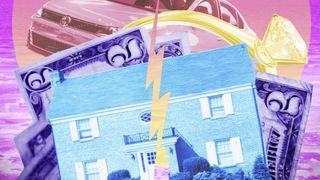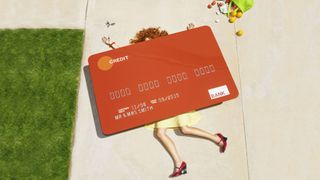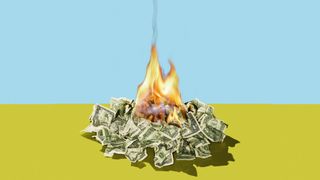
If you grew up during the most recent recession, the thought of even getting a credit card can seem intimidating. Coming of age—or even trying to start a career—during a time of economic uncertainty can make you want to squirrel all your money away in coins, Scrooge McDuck style. But until the system changes, we all have to work within it, and the way for you to master the system is by getting good credit.
The best way to establish good credit—and, sometimes, to get cash back or travel rewards—is to use credit cards. According to recent data from financial website Magnify Money, 195 million Americans use credit cards, with an average of 2.3 per person. But less than half of households pay their bills in full every month, and in total, Americans have a whopping $527 billion in credit card debt.
Those numbers can rightly seem intimidating—but there are simple strategies you can use to get started building credit that will help you in the long term. And if you spend responsibly, you can get lots of great perks along the way. Here's what you need to know.
Want to buy a house someday? That's going to be really tough to do without credit cards, even if you're scared to get one. "One of the best things a credit card can do is help you maintain and build a good to excellent credit score with little to no effort," says Nick Clements, the cofounder of Magnify Money and a veteran of the credit-card industry. "A credit score affects renting an apartment, getting a car, and your auto insurance premium." According to Consumer Reports, a bad credit score is worse than a drunk-driving conviction when it comes to your car insurance costs.
Once you feel comfortable with one credit card, you might want to get a second one just to be safe, says Liz Weston, personal finance columnist at NerdWallet and author of the book Your Credit Score. "You don't want to be beholden to one credit card issuer," she says. "If you're traveling, it's essential, because if one credit card gets shut down for fraud and you have to wait for another one to show up, that can be very uncomfortable."
2. But you don't need to spend much to build credit.
If you're afraid of credit, know that you can put barely any money on your credit card and it'll help your score, as long as you pay on time and in full every month. You do not—repeat, do not—need to carry a balance from month to month to build credit! That's a common myth, but it's 100% not true, and in fact, you should never, ever, accrue credit card debt if you can get away with it, because you'll have to pay pricey interest on top of your bill.
So get a credit card without an annual fee, put your Netflix subscription on it, and set it to autopay the full balance from your checking account each month. Then put your physical card in a safe place in a drawer somewhere, and boom: you're building credit. The key is to use your cards lightly, but regularly, and to pay the balance off in full every month. Thank yourself when you need to buy a car down the road.
Stay In The Know
Marie Claire email subscribers get intel on fashion and beauty trends, hot-off-the-press celebrity news, and more. Sign up here.
3. A debit card can't protect you like a credit card can.
Credit cards offer lots of protection against things like identify theft. For example, if someone steals your credit card and goes on a shopping spree, you can contest the charges and not have to pay them. Debit cards offer similar protections as well, but the difference is when a thief makes charges with your debit card, that money is already gone, and you have to fight to get the money back in your checking account. If that criminal charges $1000 with your debit card, that $1000 is gone, at least for a while, and that can affect other bills. "I wouldn't use anything but a credit card for online purchases," says Liz Weston, a personal finance columnist at NerdWallet and the author of the book Your Credit Score. On top of that, credit cards offer features like travel insurance, rental car coverage, and theft and loss insurance, so if you buy Christmas presents and they get stolen, you're covered.
4. Have no credit? There's still a card for you.
If you're brand new to the job market and have no credit score whatsoever, you have two options. If you're a student, you can open a student credit card, which you can often get co-signed by your parents if you don't have independent income yet. And if you're not in school, you may be able to open a secured credit card, in which you put down a deposit and get a monthly credit limit equal to what you've deposited. After a while, the credit card company will review your account, and if you've been responsible with your credit, they may decide to convert you to a normal credit card and give your deposit back to you. Consider a secured card training wheels for the real thing.
5. You can have several credit cards, but make sure you're careful.
Credit bureaus look at your "utilization," meaning how much you spend relative to your credit limit. So if you spend $500 a month, it's better to spend that across three cards with a $1000 limit each rather than spend it all on just one card, because it's all about the ratio of debt to credit. That may encourage people to sign up for lots of credit cards, especially given all the rewards you can get. But think twice, Weston says: Applying for a bunch at once dings your credit, so space things out at least every few months. (That's why you shouldn't apply for any cards around the time you're getting a mortgage.) And once you have multiple cards, it can be tough to keep track of them all, monitor them all for fraud, and make sure they're all getting used on a regular basis. And annual fees on some cards can really add up. So make sure you're doing what's best for your own lifestyle.
6. Always, always, read the fine print.
Beverly Harzog, credit card expert and author of The Debt Escape Plan, says credit cards may hide lots of things you don't know about in the fine print of your agreement. "They're not going to tell you any of the questionable stuff on the [signup] website," she says. "You have to dig for stuff." Before you get the card, click around until you find the terms and conditions page. Read everything. And after you get your card, read the full disclosure statement, not just the box with the fees and interest rates. That way, you'll know about things like restrictions on rewards—like only getting your sign-up bonus if you spend a certain amount in the first few months.
7. Your "cash back" bonuses don't come from nowhere.
Every time you buy something with a credit card at a store, the store has to pay somewhere around 1.7 to two percent of your bill back to the credit card company. And it's that cut that sometimes ends up coming back to you in the form of cash back. So don't go spending lots of money thinking you're getting a cash-back reward for it on your card. In reality, it's more like a tax refund—you basically already paid the money, and you're getting it back with your card rewards. Magnify Money's Nick Clements notes that credit card companies are in such an intense bidding war for customers that at this point, you shouldn't get a credit card that offers less than two percent cash back on most purchases.
8. They might make you spend more money.
Paying with plastic might make you spend more money in general. A 2001 study from MIT found that people were willing to pay more at an auction for the same item if they were paying with credit versus cash, and since then multiple studies have confirmed the effect, according to the New York Times. And that's without even considering how easy it is to pay with your phone these days.
"It feels less real," says Jean Chatzky, host of the Her Money podcast and author of Age Proof. "With all of the tech innovations, with Venmo and with Apple Pay, it's a lot easier to just spend without thinking about it. You used to have to pull money out of your wallet, and you had to see when that money is gone." Chatzky recommends not saving your credit card information on a mobile pay device or on online shopping sites, because physically entering your credit card information makes you think about what you're spending your money on.
RELATED STORY

Taking It to the Limit: What Happens When You're Addicted to Overspending?
9. Store credit cards may not be your best bet.
There are two key types of store credit cards: ones that give you a heads up on sales and maybe a discount at a store like Macy's, and ones that provide financing on big-ticket items. Neither are the best deal for most shoppers, experts say. Chatzky says your typical store credit card has a much higher interest rate than a credit card from a bank, and the credit limits are much lower. If you're going to get one, she recommends only using it for that retailer and always paying in full every month. You might get perks like store discounts and advance sales, but the interest rates are killer if you carry a balance. "You have to weigh the benefits that store cards offer you against the benefits of just using your very best cash back or miles card," Chatzky says.
But the second kind of credit line—the kind that you'd use to buy furniture, say, or expensive jewelry—is one you should always run from. Nick Clements from Magnify Money says those deals pull a sneaky trick that you might not even know about. When a store promises you zero-percent interest for six months, they don't mean they waive it, they mean they defer it. "During that zero-percent period, they're keeping track. If you don't pay off the balance in full, you get a retroactive charge, and it's like you never had the offer at all," Clements says. If you want to make a big purchase without interest, many banks and credit-card issuers have zero-percent interest offers, without the tricks up their sleeve. So don't be fooled by the sales pitch at the register. Do your research ahead of time.
When a store promises you zero-percent interest for six months, they don't mean they waive it, they mean they defer it.
10. Not all rewards cards work for everyone.
If you do carry a balance on your credit card, don't get near rewards cards, NerdWallet's Liz Weston says; instead, go for a card that has a super-low interest rate. But if you don't carry a balance, there are tons of rewards cards that might work for you. Hotel credit cards can give you elite status, while airline cards can give you the perks you usually have to pay for, like early boarding or free back check. General travel credit cards, like the Capital One Venture card or the Chase Sapphire Preferred, give you points that you can use on travel anywhere. But make sure you're using these points; a 2011 study from the research company Colloquy found that Americans leave billions of dollars worth of rewards on the table each year.
If all the travel rewards points and miles confuse you, opt for a cash back card that rewards you for the purchases you tend to make, whether that's gas or groceries or going out to dinner. No matter what card you pick, Weston recommends checking up on your card every year or so to make sure the rewards still fit your needs. "They come in with a big splashy bonus and a really rich rate, because they want people to sign up for it, and then the programs get watered down over time," she says.
RELATED STORIES

My Secret Shame: I Am *Clueless* About Money
RELATED STORIES

Don't Blow It: The 6 Most Common Money Questions, Answered
RELATED STORIES

Half of the Finance Advice You Get Is a Lie—Here's What to ACTUALLY Listen To
If you're drowning in credit card debt, Beverly Harzog says there's help out there for you. She recommends the National Foundation for Credit Counseling, which will give you much-needed advice at little to no cost. "If someone gets in over their head, feeling like they're out in the ocean, reach out to somebody," she says. "I've been in credit card debt before in my 20s, and it's a terrible feeling, so just remember you can reach out."
Follow Marie Claire on Facebook for the latest celeb news, beauty tips, fascinating reads, livestream video, and more.

Megan Friedman is the former managing editor of the Newsroom at Hearst. She's worked at NBC and Time, and is a graduate of Northwestern's Medill School of Journalism.
-
 Kate Beckinsale Says Never-Ending Claims She's Had "Unrecognizable Surgery" is Taking a "Toll"
Kate Beckinsale Says Never-Ending Claims She's Had "Unrecognizable Surgery" is Taking a "Toll""...it happens constantly and it’s usually women that are doing it."
By Danielle Campoamor Published
-
 Eva Mendes Shares Sweet Post in Support of Ryan Gosling and His New Movie
Eva Mendes Shares Sweet Post in Support of Ryan Gosling and His New Movie"Do you believe in happy endings?"
By Danielle Campoamor Published
-
 King Charles, Queen Camilla and Royal Family Members Take Over the Late Queen's Former Patronages
King Charles, Queen Camilla and Royal Family Members Take Over the Late Queen's Former PatronagesBuckingham Palace announced a "major review" of over 1,000 royal Patronages and charity Presidencies.
By Danielle Campoamor Published
-
 This Mutual Fund Firm Is Helping to Create a More Sustainable Future
This Mutual Fund Firm Is Helping to Create a More Sustainable FutureAmy Domini and her firm, Domini Impact Investments LLC, are inspiring a greater and greener world—one investor at a time.
By Sponsored Published
-
 Don't Stress! You Can Get in Good Shape Money-wise
Don't Stress! You Can Get in Good Shape Money-wiseYes, maybe you eat paleo and have mastered crow pose, but do you practice financial wellness?
By Sallie Krawcheck Published
-
 The Future of Women and Work
The Future of Women and WorkThe pandemic has completely upended how we do our jobs. This is Marie Claire's guide to navigating your career in a COVID-19 world.
By Megan DiTrolio Published
-
 What Travel Exec Ruzwana Bashir Wears to Work
What Travel Exec Ruzwana Bashir Wears to WorkThe founder and CEO of experiences booking website Peek.com has the chic casual look on lock.
By Megan DiTrolio Published
-
 How to Get a New Job in a Virtual World
How to Get a New Job in a Virtual WorldYour Zoom game has never been stronger.
By Rachel Epstein Published
-
 The Best Low-Risk Investments, According to Sallie Krawcheck
The Best Low-Risk Investments, According to Sallie KrawcheckThere's no such thing as a completely risk-free investment, but these five money-makers are pretty darn close.
By Sallie Krawcheck Published
-
 The Ultimate Guide to Buying A Car
The Ultimate Guide to Buying A CarIn Marie Claire's latest money column, we break down one reader's plan to make a life-changing purchase. This month, two Capital One pros help Tara, a fintech program manager, figure out how to afford her very first car.
By Megan DiTrolio Published
-
 The Sacred Boom
The Sacred BoomWith the demand for mystical services on the rise, a growing number of women are channeling their spiritual gifts into full-blown careers.
By Tatiana Boncompagni Published